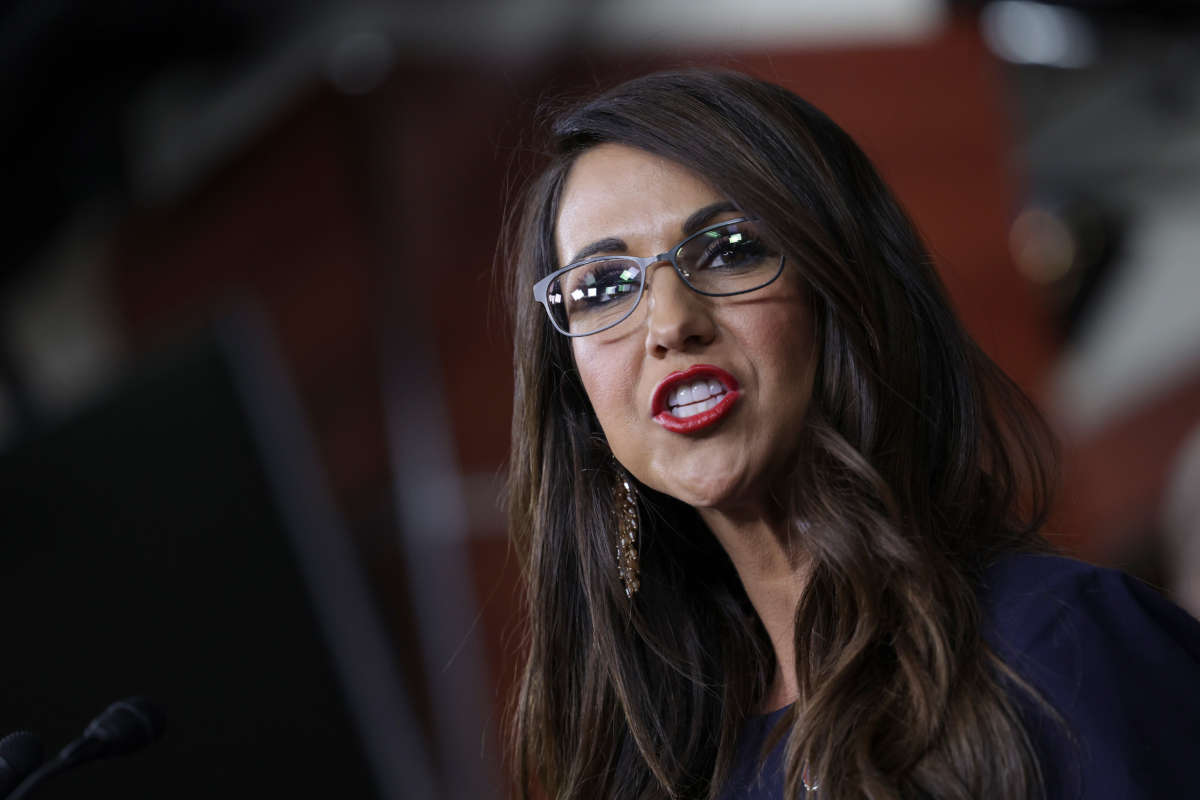Congresswoman Lauren Boebert (R-Colorado) spoke at a religious service this past weekend, where she denounced the longstanding consensus that there should be an established separation between church and state in the U.S.
Speaking to a crowd at the Cornerstone Christian Center in Basalt, Colorado, on Sunday, the far right lawmaker suggested that the proverbial wall should come down — and that religion should dictate how the government acts.
“The church is supposed to direct the government. The government is not supposed to direct the church,” Boebert said. “I’m tired of this separation of church and state junk.”
Boebert also claimed that the notion was not included in the Constitution and was only referenced in a letter that President Thomas Jefferson had written to his supporters.
“It was not in the Constitution, it was in a stinking letter and it means nothing like what they say it does,” she said.
“I’m tired of this separation of church and state junk.”
Lauren Boebert went full theocracy, and proclaimed, “The church is supposed to direct the government” per the founding fathers. pic.twitter.com/XW5nXZZ6r8
— PatriotTakes 🇺🇸 (@patriottakes) June 27, 2022
The letter that Boebert referred to was written by Jefferson to the Danbury Baptist Association. Although the letter is where the term “separation of church and state” originates in American politics, Jefferson says in the letter that the separation is derived from the First Amendment of the Constitution.
The First Amendment reads that “Congress shall make no law respecting an establishment of religion, or prohibiting the free exercise thereof.”
In the letter Boebert refers to, Jefferson cites the text of the First Amendment, writing:
I contemplate with sovereign reverence that act of the whole American people which declared that their legislature should ‘make no law respecting an establishment of religion, or prohibiting the free exercise thereof,’ thus building a wall of separation between Church & State.
The doctrine that the U.S. government should operate independently from the influence of religious beliefs or causes was also enshrined in laws that were passed during the nation’s earlier years, including in the Treaty of Tripoli. Enacted when Jefferson’s rival, President John Adams, was newly inaugurated, the treaty clearly asserts that “the government of the United States of America is not in any sense founded on the Christian Religion.”
Boebert’s comments, which clearly contradict the text of the Constitution, are indicative of the right wing’s embrace of white supremacist and Christian nationalist ideals.
This past week, the U.S. Supreme Court ruled to encroach upon the separation between church and state by siding with a public school football coach who led prayers with students on the field before and after games. In an amicus brief to the Court, one of those student athletes, using the pseudonym F.P., said he was upset that his senior homecoming game became a “media circus” because of the prayers. F.P. also said that he was “punished” for not taking part in the prayers, and that he was “not allowed to play a quarter in the next game” in spite of being a star player.
The ordeal left the player feeling “overwhelmed,” and he “missed a day of school and football practice the following week” as a result, he said.
The Supreme Court’s ruling to weaken the separation of church and state could have broad implications — and may enable the punishment of individuals, covertly or overtly, for having the “wrong” beliefs, particularly those who are not Christian.
Join us in defending the truth before it’s too late
The future of independent journalism is uncertain, and the consequences of losing it are too grave to ignore. To ensure Truthout remains safe, strong, and free, we need to raise $46,000 in the next 7 days. Every dollar raised goes directly toward the costs of producing news you can trust.
Please give what you can — because by supporting us with a tax-deductible donation, you’re not just preserving a source of news, you’re helping to safeguard what’s left of our democracy.
